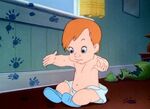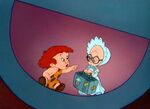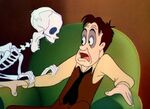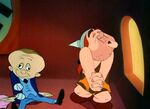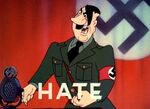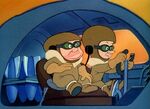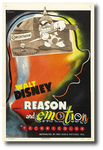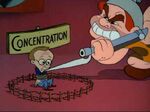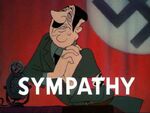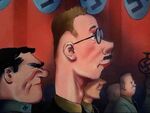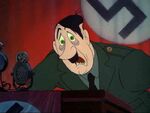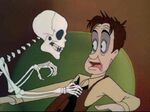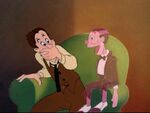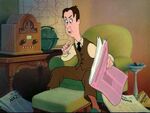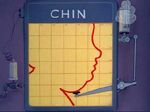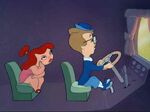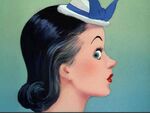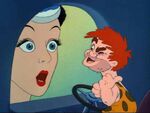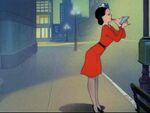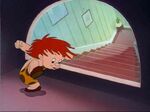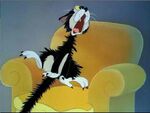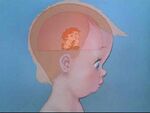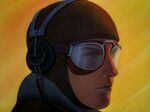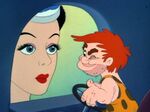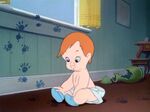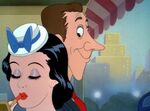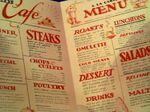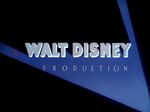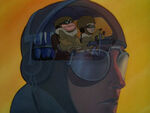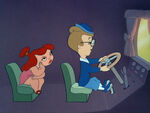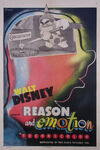It may not be suitable for all readers. |
Reason and Emotion is a 1943 World War II cartoon. It focuses on Reason and Emotion, two abilities in one's mind, respectively depicted as a university professor and a caveman (or in the mind of a female, Emotion is depicted as a girl in an immodest pink dress and red high heels).
Plot
As a toddler (simply known as "Junior") knocks over a plant from the window, the narrator points out that in the undeveloped mind of a child, there is only Emotion. We see him, as a cave boy, in his head, all alone, able to do what he wants. This is because Reason isn't born yet. Emotion then gets Junior to pull a cat's tail. Adventurous and excited, he talks Junior into going downstairs, only for him to fall and hit the wall. Emotion cries just as someone appears. That would be Reason (simply depicted as a baby in a dress and bonnet for now), who tells Emotion that if he (Reason) had been in Junior's mind sooner, this accident would never have happened. Emotion simply tells Reason he (Emotion) is the boss around there, but Reason tells him "Time will tell." This starts the battle for mastery.
Later, Junior grows up. This time, Reason and Emotion use him for a car. Reason is in the driver's seat with Emotion in the back, much to the latter's boredom. Reason tells Emotion to control himself and that there will be no nonsense when he (Reason) is driving. Emotion, wanting to live dangerously, has Junior look at a beautiful lady as he is passing. Emotion demands to get Junior acquainted with her, but Reason tells him they must maintain proper respect for womanhood, and to sit down and behave. Emotion uses his club to hit Reason so he could get Junior to walk near the lady. He makes Junior say to her, "Hi, babe. Goin' my way?" Shocked and angry, she slaps Junior in the face. The narrator points out that the slapping in the face is what you get for not listening to Reason.
We then look into the woman's head. Female Emotion attempts to get her to regret slapping him because "he was cute". She asks her if she wants to be an old maid, but Female Reason reminds her that they are a lady. Female Emotion, tired of sitting around and being a lady, decided to have fun. She suggests eating. Female Reason, not actually hungry, decides on something light like tea and toast. Female Emotion, big on pleasure, demands a club sandwich and a great double milkshake, potato salad, and so much stuff, pushing Female Reason out of the way. In the middle of what is being done, she slaps Female Reason for reminding her that they are on a diet. Female Emotion's doings fatten the lady up, proving once again that uncontrolled Emotion can cause a lot of trouble.
We go right to the Male Reason and Emotion, this time in the head of a man (not Junior) who tries to keep up with current events on the radio. Reason tries to get him not to believe everything he hears, but Emotion says it's true, and tries to put Reason out of the way, but sarcastically, the narrator pretends to agree, pointing out that Hitler destroyed Reason by preying upon Emotion's weakness with fear, sympathy, pride, and hate, like in the Germans' minds. It is shown in the head of a Nazi superman (not the comic superhero).
Then, the narrator says there is only one answer: Reason's job is to think, plan, and discriminate; whereas, Emotion's is to be a fine, strong emotion that loves his country, freedom, and life. The narrator says that with Reason firmly in the driver's seat and Emotion beside him, we would go and correctly do the job we have set out to do, as we are seeing a group of planes fly.
Characters
- Reason (voiced by Frank Graham)
- Emotion
- Junior
- Miss Reason
- Miss Emotion
- Lady
- John Doakes
- Adolf Hitler
Trivia
- The caveman-like "Emotion" character was drawn as a caricature of animator Ward Kimball.
- A censored version with all references to World War 2 cut out of the short, including a scene with "Reason" and "Emotion" in a Nazi concentration camp, narrated by Ludwig Von Drake, was part of the Walt Disney's Wonderful World of Color episode "Man Is His Own Worst Enemy". It has been used since, with the uncensored version rarely being seen.
- Nominated for an Academy Award (Short Subjects - Cartoons)
- Reason and Emotion has been cited as the inspiration for several later Disney projects utilizing a similar framework of the mind as pilot to the body such as Cranium Command, Inside Out, and Inner Workings.

